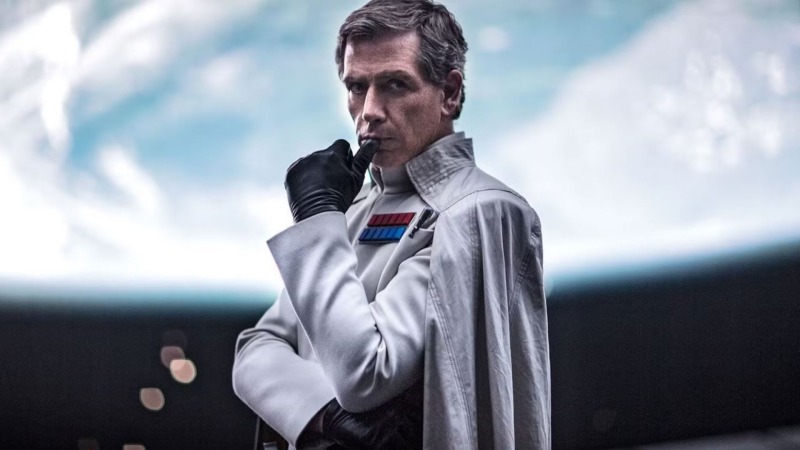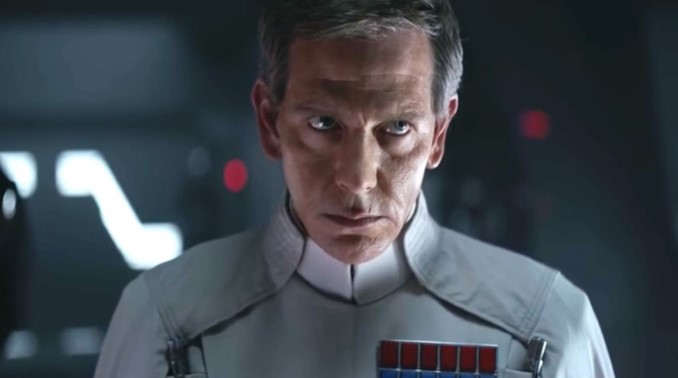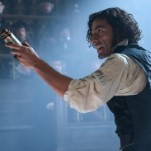Orson Krennic: Star Wars’ Perfectly Pathetic Villain

There’s an understandable tendency, in writing a cinematic villain, to strive to create too perfect a foil for your heroes. The impressiveness of a hero, after all, is often boiled down to the daunting stature of the obstacles they must overcome and the antagonists they must face down–particularly in a trope-powered space opera on the scale of Star Wars. What is Luke Skywalker, without the monolithic presence of Darth Vader and the Emperor to strive against? This desire for an imposing bad guy so often leads to the writing of villains who are depicted as ultra-competent, ultra-wily and ultra-powerful–evil masterminds who can both kick your ass and remain perpetually one step ahead tactically. It’s easy to see why bad guys are written in this mold: You want them to be memorable! You want them to be scary. You want them to be “a true challenge,” to press your heroes to the brink. But this mode of writing can also be a pitfall, stripping villains of a more recognizably human malevolence, detestability and even pathos, in the name of making them perfectly wicked killing machines. And to return to the Star Wars galaxy, the character who best illustrates the value of ditching traditional villain traits is none other than Rogue One’s Orson Krennic, about to make his triumphant, sniveling return in the upcoming second season of Andor, again played by the wonderfully oily Ben Mendelsohn.
I confess, I was overjoyed to see the casting news about Mendelsohn being added to the second season of Tony Gilroy’s critically acclaimed Star Wars espionage series. Even though it makes perfect narrative sense for the director of the Death Star’s development to be threaded into the story as we draw nearer to the events of Rogue One, the vagaries of casting and production schedules mean you can never take these things for granted. But Andor season 2 should benefit greatly from the overarching presence of Krennic as an Imperial architect pushing us toward an inevitable showdown concerning the birth of the Rebellion and the creation of the Empire’s superweapon. He has long been my favorite modern era Star Wars villain, and Andor season 2 is the perfect excuse to remind the world of why Krennic is such a fantastic character for this setting: Not because he’s an evil genius, but because he’s such a perfectly pathetic, bootlicking rube. In a fictional universe where the bad guys are typically overpowered space wizard warlords or cooly calculating strategists, Krennic is neither: He’s an entitled, petulant bureaucrat driven by a pathological need for praise and recognition, constantly being shown up and embarrassed by superiors and heroes who are far smarter than him. Which is to say, Orson Krennic is easily the most realistic of Star Wars villains, the guy who best encapsulates the worst aspects of our own society.
There are aspects of Director Orson Krennic that are almost sympathetic, or at the very least more relatable than the typical Imperial antagonist in a Star Wars narrative. The man has an asteroid-sized chip on his shoulder, seemingly indicative of a person who has been excluded from elite circles throughout his entire career, and both resents and lusts for power as a result. Where the typical Imperial officer reeks of blue-blooded aristocracy, a choice reinforced to the American viewer in particular by the typical casting of prim British types as officers in the original Star Wars trilogy, Krennic comes off as more of a tryhard middle-class striver, retaining Mendelsohn’s rougher, more provincial Australian accent. His character likely doesn’t come from great wealth or power. When we pick up with him in Rogue One, he’s already invested more than a decade into the Death Star project that few of the other high-ups demonstrate much support for, and his combination of tough luck upbringing and lack of support has resulted in an inferiority complex that drives him toward both narcissism as a compensation and latent self anger. What actual talents does he possess? Determination, for one. Ambition, absolutely. Confidence, sure … even though Krennic’s confidence tends to be unwarranted. He profiles as a modestly intelligent mid-level manager who wants to be something bigger–he dreams of being recognized as brilliant and entering the c-suite, but it’s clear to us that the gatekeepers are never going to let him pass. Krennic is not executive material, not when he’s surrounded by Imperial intelligence professionals and military officers who can all run circles around him. And he has no idea that he’s a joke to them.

Such a poker face on this calm, collected professional. Who can even guess what he might be thinking?
The all-consuming desire for recognition is what defines Orson Krennic as a character, and what Mendelsohn’s performance communicates so well about him: He is absolutely desperate for someone to tell him that he’s good enough, and reward him fittingly. He jealously hoards any kind of credit for every aspect of the Death Star’s conception, construction and potential for menace, demanding to be acknowledged whenever the station does anything, as if it’s going to be introduced as Orson Krennic Presents: The Death Star. Did he actually do any of the design work himself? Of course not: Krennic is just a facilitator who is eager to accept credit for the brilliance of others, the Elon Musk of his day. Without the likes of Galen Erso, he’ll never be able to gain the recognition he craves, which is motivation enough for Krennic to personally fly across the galaxy to track Erso down in the opening sequence of Rogue One, and at least attempt to convince him to bring his family and come willingly. Their fates are tied together, because Krennic has staked so much of his career cachet on the Death Star project as his signature contribution to the Empire. All of his eggs, plus every egg he’s been able to beg and borrow from anyone else willing to lend an egg, have been precariously heaped in this one basket. In his eyes, either the Death Star is going to make him the most valued man in the Empire under Lord Vader and the Emperor, or he’s going to go down in its flames. There’s no middle ground for Krennic, and almost no sense of self preservation.
At the same time, however, Krennic is so laser focused on his goals that he becomes embarrassingly blind to the machinations of both “peers” and foes happening all around him. He’s oblivious, for instance, to the fact that the leaks/informant about the Death Star program must have come from Galen Erso’s installation on Eadu, and even after destroying the holy city on Jedha with the Death Star, he has to be told directly to his face–in front of a crowd of onlooking officers–that Erso must have betrayed him, something he seems to initially disbelieve. Had he not been told, he presumably would have gone right on being ignorant. Grand Moff Tarkin clearly delights in pulling the rug out from under the pompous Krennic, even as the director rages and shrieks that “we stand here amidst my achievement, not yours!”, practically slavering in his disgruntled state. The entire rest of the room is cringing in the discomfort of having to witness Krennic make a fool of himself as Tarkin effectively swoops in to commandeer the newly completed weapon for himself. Tarkin pulls off the power play, making an example of Krennic for anyone else in the room that would ever think to undermine him.
This relationship, between Krennic and Tarkin, crystalizes Krennic’s greatest weaknesses and failings, which are ultimately the things that make him such an interesting character. He has the fatal combination of unearned ego and a lack of self control and awareness, particularly when he’s being denied that which he intensely believes he deserves. Anyone who knows how to push the guy’s buttons can easily make him lose his cool.
Consider the difference in how Krennic and Tarkin–a CGI abomination, yes, you don’t have to point it out in the comments–deliver their lines. Tarkin is cool, calm, collected and sardonic as he not-so-subtly dresses the director down. He gives the impression that he knows precisely what he’s doing, and that he can either manipulate others into doing what he wants, or force them when push comes to shove. He has ice water running through his veins, but he’s also wryly enjoying himself, watching Krennic (who he disdains) twist in the wind. Tarkin is the kind of mastermind who is more of a Moriarty-styled villain archetype. He doesn’t speak off the cuff, and chooses his words for maximum impact. He knows how to use his power and authority, and when to use them.
Krennic, on the other hand, is a barely repressed cauldron of jealousy and bitterness in his interactions with Tarkin, coming off like a child who has just been told they won’t be getting any dessert this evening. Krennic wants to master his emotions and play the perfect, professional Imperial soldier and administrator, but he can’t do it when he feels the situation is unfair–and he always feels the situation is unfair. He’s completely unable to keep his unguarded opinion and naked ambition from leaking out of his pores, and everyone can see it. He’s desperate to lick boots, but those with true power are so unimpressed by him that he’ll never even get that chance.
And as he feels that opportunity slipping away, his prized achievement effortlessly wrested away from him by Tarkin through means that he really should have seen coming, Krennic becomes all the more desperate and unhinged. How suicidal would you have to be, after all, to travel to Vader’s sanctum specifically to make demands of the ultimate Imperial enforcer, the guy who kills random officers at will whenever they annoy him? Krennic’s drive and fear of failure override his fear of punishment or death: He’s so concerned about being overlooked, and so unwilling to be merely a cog in the system when he fervently believes he should be a CELEBRATED COG, that he’s willing to risk the very real possibility that Vader will simply snap his neck like a twig for being so impertinent. All so that he can compare capes with Vader for a moment (Mendelsohn looks spectacular in his fastidiously spotless white neckwear) and beg for an audience with the Emperor to make a case for himself as Imperial employee of the month. It’s a marvel that he survives the encounter.
Honestly, you can’t help but wonder what the hell Krennic would actually say or do, if he could get the audience with Emperor Palpatine that he’s constantly gunning for. Can you possibly imagine that meeting being a success? Given his behavior throughout Rogue One, it seems like the most likely outcome is that he would try to launch into some kind of bloviating, self-aggrandizement about his accomplishments and contributions to the cause, and then Palpatine would either fry him to a crisp in annoyance or reassign him to some podunk frontier town just to rub his true powerlessness and lack of value in his face. Krennic is in fact lucky that he’s below the Emperor’s direct level of attention.
Orson Krennic is a sorely pathetic man, but a deeply recognizable one, which isn’t always something that you can say for Star Wars characters. He’s every tyrant restaurant manager belittling his staff, certain that he’s about to be promoted to regional VP when the people at corporate actually hate his guts. He’s the head of your local HOA, who fervently believes that only his guidance and smothering attention can keep your neighborhood from instantly descending into anarchy. His kind has always existed, but it feels like we’ve rarely been surrounded by so many Krennics, increasingly instilled with power and responsibility in the halls of municipal and federal government. Donald Trump’s administration is of course bursting at the seams with Orson Krennics, greasily clambering over each other as they attempt to slither into their emperor’s gaze for a moment. The current political climate, which rewards blind partisanship in both public servants and consumers more than competence or independent thought, has been a fertile growing environment for this particular breed of ambitious sycophant. We’re living in the Age of Krennic.
Which is all to say, Orson Krennic is perhaps the most appropriate style of villain that Star Wars stories have to offer in 2025, and I can only imagine that Tony Gilroy, Dan Gilroy and others writing the second season of Andor likely recognize as much. I can’t wait to see how they choose to thread him into this season, and hope it will only deepen the lore of his legendary inadequacy. He’s a 21st century fool who has been transported to a galaxy far, far away, realizing only in his final moments the cavernous depth of his failure. Would that the Orson Krennics of our own world could share the experience.
Jim Vorel is Paste’s Movies editor and resident genre geek. You can follow him on Twitter or on Bluesky for more film writing.






































